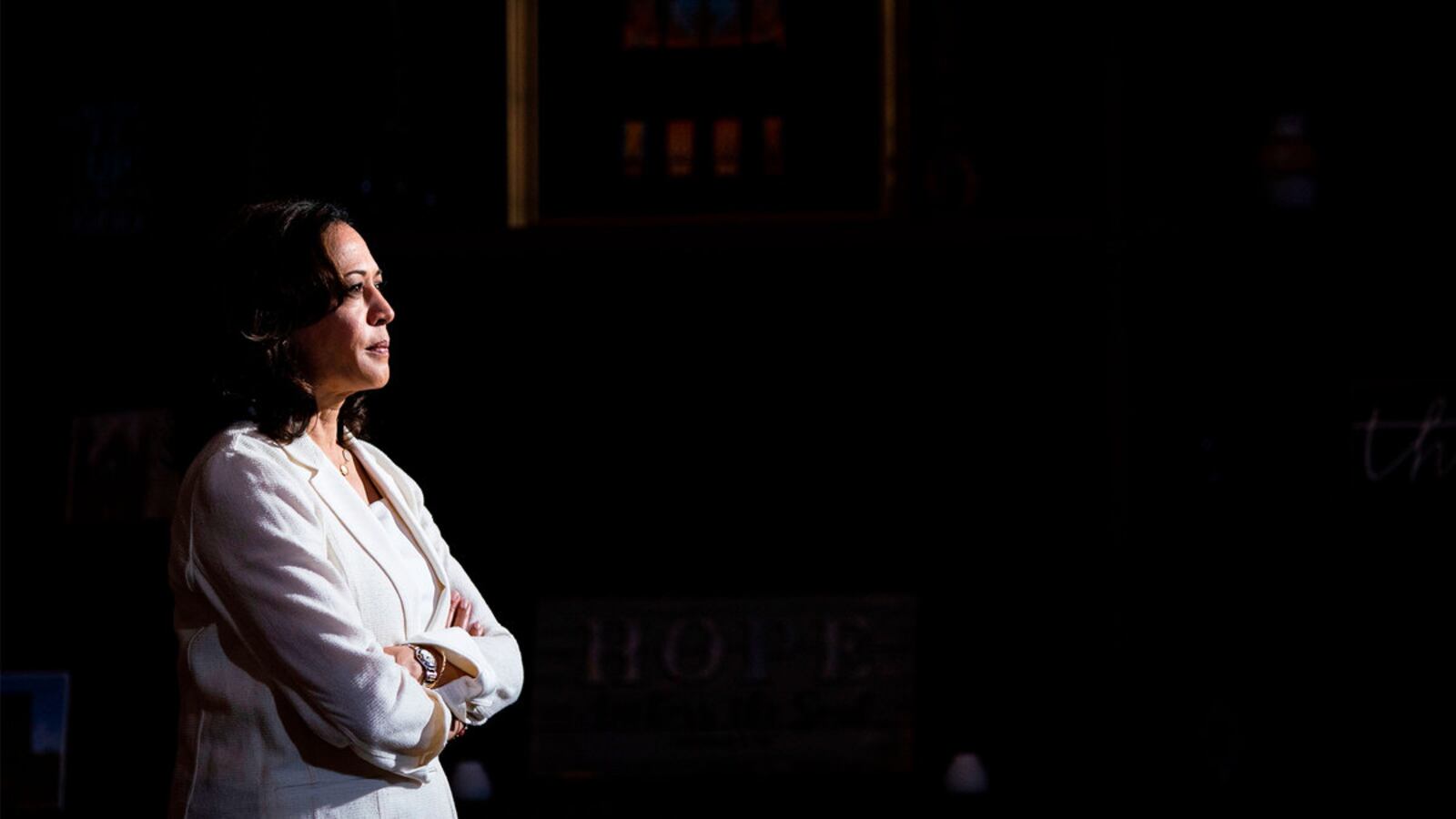As more than a million viewers tuned in to see ‘90s icons Brandy and Monica, singers of the hit song “The Boy is Mine,” in the same room for the first time in nearly a decade last week, a familiar face suddenly popped up on the screen between them: Senator and vice presidential candidate Kamala Harris.
Wearing a Howard University shirt, Harris made a plug to get registered to vote—and social media was on fire with comments about it. An R&B battle is a rare place for a national candidate to make an appearance, but Harris makes cultural history in many ways. During her speech at the Democratic National Convention there was another moment of glee as she gave a shout out—absent any translation—to her “chittis.” For many of us it was a gleeful moment to hear her recognition of her aunts playing a role in her life, along with her mother Shyamala Gopalan’s name spoken on a national stage.
But for some in the Indian-American community, that single word, and her nomination, have created rifts between people of different generations, political beliefs, and immigrant status. The Indian-American electorate is anything but a monolith, and those of us who grew up in the United States are in a vast gray area between two ends of the reaction to Harris.
While I am elated to see so many takes on Harris published by South Asian writers and how she identifies or doesn’t with the Indian-American community from around the world, they have largely been expressing the opposite ends of the political spectrum. On one side, we have the expressions of pride and effusive praise no politician should receive; and on the other, the anger over her policies, alleged casteism, and the perception she is being opportunistic and somehow unacceptably Indian. And then there’s the obvious racism of questioning her credentials and birth place, as well as the multiple occurrences of not including both of her identities from white writers and large news outlets.
When I first heard the news of the nomination, I thought of my mother and what Harris would say about her. Like Gopalan, my mother is a Tamil woman from a generation that was part of the early, post-1965 major wave of immigration to the United States. My mom sent me a text saying she and Dad were “extremely proud to have a South Asian with Tamilian background represented in 2020 presidential ticket” and that she was happy the country “has woken up, finally joining rest of the world” in recognizing a non-white woman. For my parents, who came here with me in the early 1980s, it’s an incredible sight to see a woman like Harris in such a prominent position in their adopted country.
A part of me felt that ethnic pride, but some of Harris’ political positions complicated the picture. It’s hard for me to separate the feelings that text stirred up from the reality of Harris’ record on issues like incarceration and Palestine, to name a couple. Varshini Prakash, the young Indian-American woman who founded the climate activist group Sunrise Movement, articulated my feelings well in a statement: “I am holding the significance of this moment to see the first mixed race Black and Indian woman on a presidential ticket. I’m also deeply aware of Senator Harris’ record [and how] a number of her decisions harmed communities of color.”
This gray area where Prakash and I lie has angered many newer Indian immigrants because they feel like expressing any kind of joy over Harris implies a wholehearted endorsement of her. More recent immigrants from India, having witnessed the rise of violent Hindu nationalism under Prime Minister Narendra Modi and his party and how the Hindu majority appears to be pandered to opportunistically for votes and support, tend to assume Harris is doing the same with Indian-Americans. They argue that someone like congresswoman Pramila Jayapal is better representation than Harris. And I ask, why can’t we celebrate that part of both, and hold both accountable for their politics?
Some newer immigrants have taken to social media to insult Indian-Americans for being vapid, easily swayed by dosas with actress and producer Mindy Kaling, and not intelligent enough to unpack domestic and foreign policy. In these barbs, there was what felt like a familiar accusation: you’re not Indian enough to understand why your small happiness is idiotic, and she is bad for you and you’re not American enough to be critical of her.
Any Indian-American over a certain age has heard this tired line of questioning. It's bad enough to hear it from white people. But it's even more insulting to hear it from fellow Indians. It ignores one glaringly obvious fact absent of any politics: they don’t know what it was like to be Indian in the United States before they came here.
One experience is certainly not better than the other, but the divide results in different perceptions of what it means to be a minority, a person of color, to be othered because we’re not Black or white. It’s a feeling, and an entire life, newer immigrants simply do not know because in more recent times, immigration laws, nearly ubiquitous Indian grocery stores, and the internet, and an opening of cultural borders have made that life a thing of the past.
The joy people like my parents and friends have expressed over Harris could be a point of ridicule and derision for newer immigrants. Or, it could be a way to learn about our life, our history here, the racism and violence we may have experienced, the many struggles that resulted from leaving home to go to a majority-white country for educational and professional opportunities before communication and exposure was constant.
There’s another layer for South Indians, too, particularly those like me in the Tamil community. For decades, the default for being “Indian” in the United States was a generic, flattened version of the rich diversity of India’s many ethnic groups like Tamils, Maharashtrans, Bengalis, Telugus, Punjabis, Gujaratis, and dozens more, hundreds of languages, and cultures. We were few, so we banded together, sometimes putting aside language, food, and even religious differences.
During those initial waves of immigration, a certain reality was established: North Indian food, the Hindi language, and general customs became the default of what non-Indians thought being “Indian” in America encompassed. The Western explosion of Bollywood didn’t help, pushing a fair-skinned aesthetic more genetically common with certain North Indian groups than any South Indians, who tend to be darker skinned.
Being South Indian and Tamil was something with which not even other Indians were all that familiar. Out of the roughly 4.1 million Indian-Americans in the country, about 350,000 say they speak Tamil at home. This isn’t to say we are oppressed, even for people like me who never had anything remotely close to the wealth associated with the community, still had several privileges. But seeing and hearing Harris even be able to have favorite foods we make at home and call her aunts in a language we speak—that is something different and special for many of us.
I can only imagine what she, her sister, and mother may have gone through being the half-Black children of a divorced, single mother (her parents divorced in 1971, when she was 7). I see her relationship with the Indian community as an evolution of forgiveness, forming her own path, figuring out where she fits in as the community grows. Who are we to police that? Is it not anti-Black to say, “Well, she called herself a Black woman, she’s just saying she’s one of us because it looks good?” (Spoiler: it definitely is.)
Of course, it is discouraging to see many in our community celebrating this moment while also not being willing to understand the anger and systemic racism prompting the Black Lives Matter protests. We have a history as an immigrant community of keeping our heads down, working hard, and thinking that survival and financial success is enough to let us be both Indian and American, openly celebrating both.
But we routinely ignore that this life would never have been possible unless it was for the struggle of the civil rights movement, which led to opening up immigration to more non-white people. I contend that you cannot actually celebrate one without at least attempting to educate yourself on the other, precisely because we all need to respect how she self-identifies.
I also want to give the community’s acceptance of Harris a chance to become some sort of catalyst for this. Maybe I’m being overly optimistic, but with the state of the world right now, I think we could all savor those small rays of light and hope.
Then there are accusations of Harris perpetuating casteism, the segregated hierarchy of a society based on birth. This is an issue that goes beyond the Tamil community. For Indian-Americans who grew up outside of India, there is a different relationship with and even lack of knowledge of the caste system, a privilege in and of itself given that most immigrants to the U.S. have been “upper” caste Brahmins and largely lived in that bubble. Ignorance is never an excuse for perpetuating a flawed system, however.
In an effort not to center myself as a Tamil Brahmin in trying to explain this issue in our community, I spoke with Yashica Dutt, author of Coming Out as Dalit. Dutt said while she acknowledges Harris has never directly addressed her mother being Brahmin, “when we are analyzing her Indian identity, it is very important to note that she is. It’s a huge deal that an Indian woman [Harris’ mother] came to the U.S. in 1958 and then participated in the civil protests, but [Harris] did grow up with her mother’s side of the family... and there is a lot of caste pride in being Tamil Brahmin.”
Dutt said there needs to be “an interrogation of that idea” and how it may have impacted Harris’ views—her privilege having a mother who was able to get an education not just in the United States but in India as well, something that had largely been available only to the so-called upper castes.
“We have to talk about it because in the U.S. we can have multiple ideas. I have the identity of a Dalit person, which is an ‘untouchable’ person, but here I’m also South Asian,” Dutt explains. It is a complicated conversation she hopes we as a community continue to unpack in a critical, but respectful, way.
Of course, as a reporter and someone tired of the overt racism of the Trump era, I think our focus should be on our critique of Harris’ policies rather than her identity. I would love it if people didn’t expect every immigrant lawmaker to comment on the state of affairs in the birthplace of their parents and expect them to have a specific take on it. But the world is a lot messier than that as fascism and violent nationalism spread.
Lakshmi Sridaran, executive director of the South Asian Americans Leading Together (SAALT), told me that people like Harris who consider themselves South Asian-American “must be responsive to and take a clear stance on the transnational violence of Hindu nationalism and Islamophobia and acknowledge the impact it has on South Asian communities across the diaspora, specifically those who are Muslim, Sikh, and caste-oppressed” in an effort to be consistent on their stances against hate and violence in the United States.
Given voting patterns of past elections, coupled with Harris speaking about her mother and progressive-for-his-time grandfather more frequently and the destructive presidency of Trump, it’s fairly safe to say the majority of Indian-Americans will likely vote for Joe Biden and Harris. But the consequences of her nomination resonate beyond just the election, as any historic one does. For us, as a community, it has set off what will be a long, uncomfortable, sometimes vicious, and very necessary set of conversations on anti-Blackness, casteism, and what it really means to be Indian-American.






